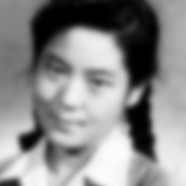 Julia Chang Lin, a scholar of Chinese literature who brought a forgotten generation of women poets in China and a new generation of post-war Chinese women poets to a western audience, died on Thursday, Aug. 1, of complications from neuroendocrine cancer in New York City. She was 85.
Julia Chang Lin, a scholar of Chinese literature who brought a forgotten generation of women poets in China and a new generation of post-war Chinese women poets to a western audience, died on Thursday, Aug. 1, of complications from neuroendocrine cancer in New York City. She was 85.
…
At Washington, she developed her skills as a writer and translator of poetry. She spoke Mandarin, Shanghainese, an Amoy dialect (her summer language), English, Cantonese, French, Fukienese (her husband’s native tongue), and a bit of Japanese. One of her teachers, Theodore Roethke, liked one of her poems, “Song of the Crazy Monk,” so much that he mailed it off to the prominent literary journal Botteghe Oscure, which published it. It was Julia’s first publication. Her thesis advisor at UW was so impressed with her PhD thesis that he helped secure its publication as “Modern Chinese Poetry: An Introduction.”
…
Dr. Lin made groundbreaking contributions to the field of modern and contemporary Chinese poetry. “Modern Chinese Poetry: An Introduction,” completed shortly after the Nixon detente made visits to China possible, enabled her to go to China to gather poetic materials and small literary journals and produce pioneering scholarly/critical studies of modern and contemporary Chinese poetry. Lin became friends with many of these poets, including Shu-Ting, who was persecuted during the “anti-spiritual pollution” movement that was launched in 1983. Among the poets translated in her first book, was Ping Hsin and Lin Huiyin whose short lyric mini-poems were pioneering works in modern China. At Ohio University she helped inaugurate Chinese language courses and, in her courses and colloquiums, she was the one-person Asian Studies department, introducing students to “The Tale of Genji” and “Journey to the West.” After retiring in 1998, she continued to champion the works of women writers in China. Her four books have been influential in bringing recognition to, and appreciation of, Chinese women poets from mainland China and Taiwan.
…
She is survived by a daughter, Maya, the artist who created the Vietnam Veterans Memorial, and a son, Tan, a poet and English professor, both of New York City; a brother Ke-Heng of Beijing; a stepsister, Yining Zhang of Lawrenceville, N.J.; and three grandchildren, Ahn Churchouse Lin, Rachel Ming Wolf and India Lin Wolf.
Click the image for the full article.





 Dissertation Reviews
Dissertation Reviews